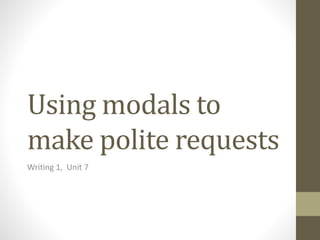
modals-and-police-requests-fun-activities-games-grammar-guides_52218 (1).pptx
- 1. Using modals to make polite requests Writing 1, Unit 7
- 2. Will and Should A: What should I have for lunch? B: You should eat something healthy like a salad from Subway. A: A salad? I’ll still be hungry if I only eat a salad! B: Will you still be hungry if you eat a turkey sandwich? A: I’m not sure. I think a sandwich should fill me up. B: I don’t know what you’re going to eat, but I’m hungry! I’m going to Subway! I’m going to try the ham sandwich for the first time. It should taste great! A: I guess I should come with you! I’ll try the turkey sandwich! Will/going to = definite/certain future Should = uncertain future or to give advice
- 3. Will, May and Might May / Might- For possibility about the future Examples: “I may go to the party. I’m not sure.” “I might go to Erica’s house after the party.” • The negative forms are may not and might not. • There is no contraction form. Examples: I might not have time to study. These cookies may not be healthy. Will – shows certainty about the future • Often written as a conjunction (I’ll, you’ll, she’ll, he’ll, we’ll, they’ll) Example: You’ll pay more if you don’t bring coupons. mayn’t mightn’t
- 4. Should: to ask foradvice. To giveadvice. To give a warning. • Contraction of negative form : shouldn’t = should not Give advice • You should eat healthy food. • You should use coupons to save money. • You should try this sandwich. It’s delicious. Give a warning You shouldn’t skip class. You might fail the class. You should not eat raw chicken. It will make you sick. Ask for advice Should I buy a new or used car? Shouldn’t I try a free sample before I buy the product?
- 5. Must /have to– to show necessity Must and have to mean the same thing in affirmative sentences. They show a need. Must is a more formal word. I must study for the next test! I have to study for the next test! I need to study for the next test! We must go inside. It’s going to rain. We have to go inside. It’s going to rain. We need to go inside. It’s going to rain. SAME MEANINGS!
- 6. Must / Have to in negative sentences. In positive statements: same meaning Example: You must (have to) buy a textbook for the class. In negative statements: different meanings Must not = against the law. Prohibited Don’t have to = not necessary (there is some choice) Example: You must not steal items from a store. You don’t have to go to the party. • Must not and cannot have a VERY similar meaning. • Contraction: mustn’t = must not.
- 7. Might / May– to show possibility Might and may have the same meaning when they are used to show possibility. They both mean the same as maybe. You might fail this class. You may fail this class. Maybe you will fail this class. SAME MEANING! It might rain soon. It may rain soon. Maybe it will rain soon. SAME MEANING!
- 8. Can = ability, possibility or *permission The man and woman can skate. The little girl cannot skate. She needs help. You can lose weight if you exercise. You can start the assignment when you get home. *Contraction of negative form: can’t CAN is often confused with MAY. CAN is used for ABILITIES. MAY is used to ask or show PERMISSION: A. May I go to the bathroom? B. Yes, you may. PERMISSION: to let, to allow, to permit A. Can you buy my lunch? B. No, I can’t. I don’t have much money. ABILITY: able, capable May = to give permission (properEnglish)
- 9. Could & Would: Polite requests Could is similar to can. Would is similar to will = Just more polite. Examples: Could I have another cookie please? Can I have a cookie? Would you lend me a pencil please? Will you lend me a pencil? Could: past tense abilities. • Can = present tense abilities. Cannot / can’t = negative • Could = past tense abilities. Could not / couldn’t =negative • Example: I could run very fast when I was young. Now that I am old, I cannot run at all! Would like = want • “Would like” is more formal than “want”. • It is Commonly written as a conjunction (I’d, you’d, he’d, she’d, we’d, they’d) Examples: *I would like to make a deposit please. *I’d like to purchase a ticket please.
- 10. Student advice: using should Advice for a friend coming to the United States
- 12. Practice using modals with pictures Follow the link and write sentences or questions about the pictures. Use modals in your statements. • http://www.englishexercises.org/makeagame/viewgame.asp?i d=8322
- 13. Imperatives = commands Instructions/requests: Sign your name on the line, please. Come to school at 8:45am. Warnings: Be careful! The floor is wet! Encouragement: Relax and do your best on the test. Have a great weekend! Get well soon! Suggestions: Let’s go to the park! (Let’s = let us) Why don’t we go to Applebees? Impolite, angry expressions: Go away! Leave me alone! Stop touching my things!
- 14. Modals make commands more polite GO TO THE LIBRARY. = Would you go to the library please? MAKE DINNER!= Will you make dinner (please)? STOP USING YOUR CELL PHONE! = Would you stop using your cell phone please? DO NOT DO THAT! =You should not do that! OR I would not do that.